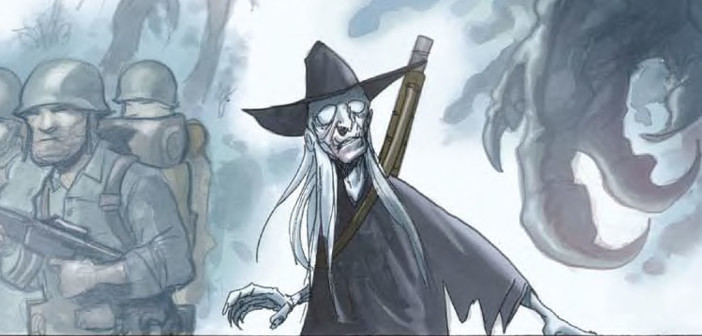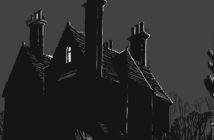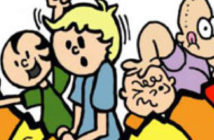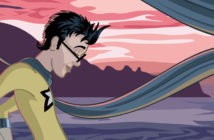Eric Powell’s Buzzard is a lonely tale of dreams—dark dreams of sadness, lost life, and isolation. The story doesn’t exist in any specific time or place, though we recognize certain aspects: America’s Old West, the grimy trenches of the First World War, mighty Viking warriors, and even Persephone sitting on her throne with Cerberus standing guard. These visions wrap around one nameless man; he’s call “Buzzard” by some, “Death” by others.
Buzzard wanders the world a damned man, cursed by a demon masquerading as a human. But Buzzard isn’t searching for an end to his curse—the time has passed for that. He’s been under the deathless spell for so long there’s no salvation for him to find, and so he travels in an out of the evanescent mists shrouding time and space, witnessing sights of wonder and horror that he no longer possesses the capacity to care about. They’re simple small annoyances and wayward detours on his journey into infinity.
Accompanying Buzzard is a rotting horse, a creature he animates with a simple touch. And that is it; Powell is wise to not define what exactly Buzzard is capable of, for this isn’t a story of mystical rules and regulations, but rather a dreamlike lament of what it means to be a fallen and forgotten hero.
But then, Buzzard isn’t forgotten for long, as he wanders into a nameless town that is under siege by monstrous humanoids that were once the sons of the town. Buzzard kills the monsters, and the grateful villagers plead with him to kill the god who is snatching away their children. For if Death himself can’t kill a god, what can?
Powell’s Buzzard is one of the craftiest comics I’ve seen in a long time. Dark Horse proves to be the perfect publisher for this title, as it captures the company’s trademark love for horror and dark fantasy. Powell’s words are poetic and his illustrations unfold like a haunting children’s storybook. There’s one magnificent scene where Buzzard stands before a nameless city on one of his journeys; not-so-careful examination of the city’s formations will reveal grinning skeletons holds the turrets up as rotting Atlases would.
Powell gives us some oddly colloquial dialogue, too. Here’s a great quote from the town’s old woman: “We should slit his throat and eat him! Gain his powers like he did with the mangled ones.”
A nearby farmer responds: “Hush, old woman! You of anyone should know death when you see him! Rile him up and he’ll whisper death words in your ear at night and you’ll never wake up!”
Powell has crafted a special comic with Buzzard; he’s both a wordsmith and an artist, and the colors of Dave Stewart are foggy and ghostly in their tones and textures. It should also be noted that This book features a small side story called “Billy the Kid’s Old Timey Oddities and the Pit of Horrors,” which accents the book the same way the long-forgotten Looney Toons shorts adding something extra to the cinema’s main attractions.
But Buzzard is the truly special story here, and it shouldn’t be missed.
This review originally appeared on Broken Frontier.




